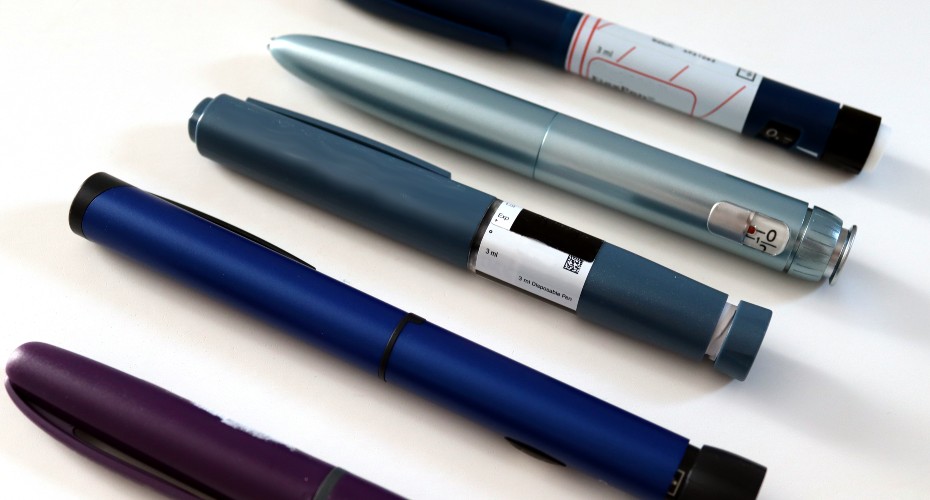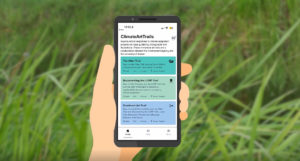Exeter doctor campaigns to cut plastic waste through promoting reusable insulin pens

Selection of insulin pens
A campaign led by a diabetes expert at the University of Exeter is aiming reduce plastic waste by encouraging patients and doctors to consider reusable insulin pens.
The work has led to the academic clinicians winning the Diabetes Quality in Care (QiC) Sanofi Green Award 2024, in recognition of their efforts to raise awareness to promote a switch to more sustainable options.
People with diabetes use insulin pens to inject the hormone, which controls their blood sugar. Many people use single-use pens, without realising reusable options are available. About four million single-use insulin pens are prescribed in England each year, accounting for about half of all prescriptions. These disposable pens generate around 79 tonnes of plastic waste. They also produce around 1,000 tonnes of carbon dioxide equivalent to 250 extra cars on the road. Some manufacturers offer recycling schemes for their pens, but most either end up in landfill or are incinerated.
Dr Vincent Simpson , a clinician at the Royal Devon University Healthcare NHS Foundation Trust and an honorary researcher at the University of Exeter, decided to take action when he realised the scale of the waste. He has recently published a paper highlighting the issues in the journal Diabetes Medicine. He said: “People with diabetes sometimes have to inject insulin several times a day. These single use insulin pens collectively build up to create a phenomenal amount of waste. A lot of people, including clinicians, don’t realise that reusable pens are safe and easy to use, and often work out cheaper for the NHS in the long run. My mission is to ensure people who use insulin and healthcare workers have the facts, and I hope many would switch to the more sustainable option.”
Vincent has already persuaded Devon Clinical Commissioning Group to add a notification to the software GPs use in Devon, that reminds them of the reusable pen option when prescribing. He has worked with GP’s, diabetes nurses and other healthcare staff to produce guidelines to help prescribe more sustainable insulin pens (https://www.royaldevon.nhs.uk/media/wapfftc5/rd-e-diabetes-sustainable-diabetes-care-pens-and-cgm.pdf). He plans to develop a website so that prescribers and patients can see what the impact of switching to a reusable pen would be.
Diabetes occurs when the body is unable to produce enough of the hormone insulin, which regulates blood sugar, for the bodies needs. In diabetes, the body does not produce enough insulin, or cannot use it effectively. A number of different types of diabetes exist, and causes can be genetic or partially induced by lifestyle. Through the longstanding partnership between the University of Exeter and the Royal Devon University Healthcare NHS Foundation Trust, Exeter has built up an international reputation for excellence in diabetes diagnosis, treatment and care. Diabetes is one of five core themes of the NIHR Exeter Biomedical Research Centre, which exists to translate research into direct benefit to patients.
Adrian Tame is a Type 1 diabetic based in Exeter. He was diagnosed with diabetes two years ago, and he manages the condition with insulin injections. He made the switch to reusable insulin pens three months ago. Adrian said “I hadn’t heard about reusable pens until Vincent told me about them at a diabetes appointment. I decided to swap over to reusable pens after that, and the process has been smooth, resulting in so much less waste than with disposable pens. I need to change the cartridge around every ten days which is easy to do – and storing cartridges saves me space in the fridge!”
Exeter-based GP Dr Deepthi Lavu, who is also a University of Exeter researcher, said: “In my experience of working as a doctor so far, many patients – and indeed health care professionals – are not really aware that a more environmentally sustainable option for insulin pens exists. The impact of disposable insulin pens on the environment is not widely discussed or available to explore. Reusable insulin pens are actually a better option for many people with diabetes as they have many advantages, and patients are often happy to switch once they know they’re also more sustainable. Just like how clinicians are increasingly offering environmentally friendly asthma treatment options, we need more healthcare professionals offering the reusable insulin pen options to patients. We need to spread the word and make people aware of reusable insulin pens so that prescribing practice can change, and patients have that choice.”
Anthony Walker, Senior Policy Officer at Diabetes UK said: “Reusable insulin pens provide the lifesaving insulin necessary to help manage blood sugar levels, whilst also being more environmentally sustainable and cheaper for the NHS in the long run, however, they aren’t suitable for everyone living with diabetes.
“Diabetes UK funded research into the world’s first ever insulin pen and remains at the forefront of diabetes research. We look forward to working with the NHS and healthcare companies as they take steps to lower their environmental impact and increase sustainability across diabetes care together.”
The paper is entitled Switching to reusable cartridge insulin pens can reduce National Health Service costs while delivering environmental benefits’, an d is published in the journal Diabetes Medicine.



